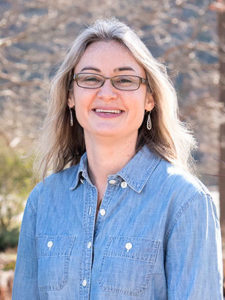The Excellence in Academic Outreach award honors those who exemplify UT’s land-grant mission by using intellectual capital to benefit the citizens of Tennessee.
Natalie Bumgarner
 Natalie Bumgarner is an associate professor and the Residential and Consumer Horticulture Extension Specialist who also serves as the statewide coordinator of the Tennessee Extension Master Gardener program. A West Virginia native, she graduated with a BS and MS from West Virginia University and a PhD from The Ohio State University.
Natalie Bumgarner is an associate professor and the Residential and Consumer Horticulture Extension Specialist who also serves as the statewide coordinator of the Tennessee Extension Master Gardener program. A West Virginia native, she graduated with a BS and MS from West Virginia University and a PhD from The Ohio State University.
What does being a Volunteer mean to you? How has UT empowered you to make a difference in a way you might not have imagined elsewhere?
To me, being a Volunteer means being a part of an organization dedicated to serving and educating diverse stakeholders from farm families to consumers in cities, towns, and rural communities across Tennessee. Coming to UT more than six years ago as an Extension specialist felt like finding the puzzle where all the pieces of my upbringing, work experience, passion, and education fit.
I was raised as the seventh generation on a family beef cattle farm in West Virginia where agriculture was as much a way of life as a career path. After falling in love with horticulture as a teenager working in a local greenhouse, I completed a BS in horticulture and started an MS with the intention of heading back to the family farm.
However, during my MS, I began to see how applied research and Extension outreach as part of the land-grant mission could address challenges in agriculture and society and uniquely deliver benefits to real people on and off the farm. That understanding gave me the passion and motivation to contribute with my data and my voice to a society where food production is practiced sustainably to benefit rural and urban residents alike.
After finishing my PhD and spending some time in industry, the opportunity to work in Extension and return to Appalachia drew me to UT. My role as consumer horticulture specialist means I engage with residents in the area of horticulture in their lawns, gardens, and communities. The essence of consumer horticulture is that life is simply better with plants. So, I have the opportunity every day to research and teach how plants in our gardens, landscapes, homes, offices, and communities can support nutrition, health, and well-being for ourselves, our neighbors, and the cities and towns where we live and work.